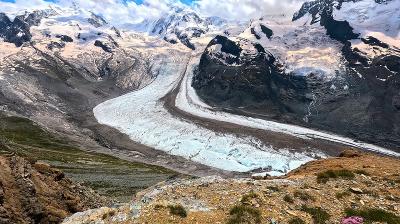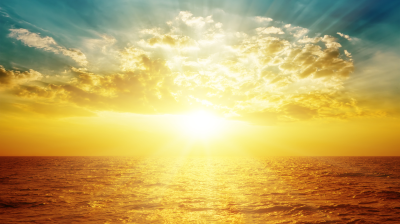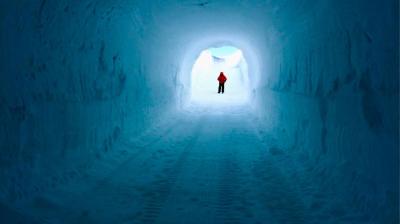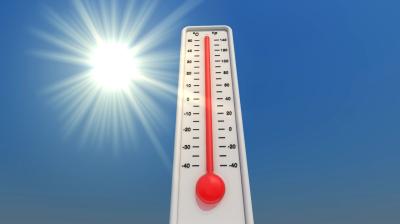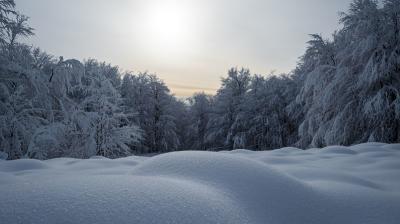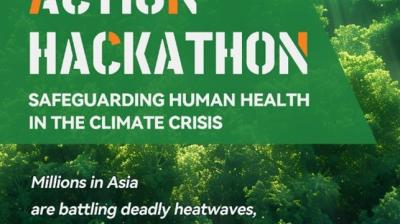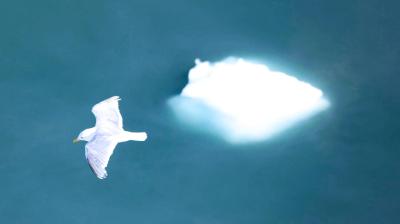The Frozen World is the "Canary in the Coalmine"
All people on Earth depend on the cryosphere. Snow, glaciers, ice sheets, sea ice, and permafrost are significant reservoirs and sources of freshwater, sustaining ecosystems and supporting livelihoods. Approximately 70% of the Earth’s freshwater is stored in glaciers and ice sheets. However, greenhouse gas emissions are driving rapid changes in the cryosphere, leading to global consequences including rising sea levels, loss of water resources, accelerated warming, extreme weather events, and significant impacts on biodiversity, ecosystems, and human livelihoods. Coastal regions, low-lying islands, polar and high mountain areas are especially vulnerable.

A new WMO Bulletin article describes the cryosphere as the "Canary in the coal mine" of the climate system because coal mines once used canaries as early indicators of potential danger: their sensitivity to poisonous gases caused their early demise during gas leaks, sounding a danger alarm for miners. Today, “canary in the coal mine” is commonly used to express alert for environmental dangers.
The article explains why the cryosphere has become one of WMO’s top priorities.
Reflecting the urgency of the challenge, WMO Secretary-General Celeste Saulo took part in high-level events at COP29 to highlight the importance of the cryosphere.
International Year of Glaciers’ Preservation
An event hosted by Tajikistan’s President Emomali Rahmon increased awareness of the importance of the upcoming International Year of Glaciers’ Preservation in 2025. In collaboration with UNESCO, WMO is facilitating its implementation.
WMO provides annual updates on the State of the Global Climate, which assess melting of glaciers through monitoring. Glaciers mass balance is an important climate change indicator. And it is an alarming one.
The recently released “State of Global Water Resources 2023” report highlights alarming findings. Glaciers worldwide respond differently to climate change, but collectively, they lost over 600 gigatons of water in 2023. 600 gigatons of water is about 13% of the world’s annual water consumption, Celeste Saulo told the event.
“This was the largest mass loss in 50 years of measurements. This underscores a pressing concern: the long-term reduction in water stored as ice will critically affect future water resources for people and ecosystems,” she said.
The ministerial-level event was attended by Shehbaz Sharif, the Prime Minister of Pakistan - one of the countries on the frontline of short term hazards like glacial lake outflows, avalanches and floods and long-term water insecurity.
A Message from the Frozen World
A Message from the Frozen World – the Global Impact of a Changing Cryosphere.” was issued by key stakeholders and rightsholders from polar, mountainous and vulnerable low-lying regions at a high-level event hosted by Norway as Chair of the Arctic Council.
Participants at the high-level event included Chile, Bhutan, Germany, Pakistan, Nepal, the Inuit Circumpolar Council, WMO, the International Centre for Integrated Mountain Development, the Ambition on melting ice (AMI) / International Cryosphere Climate Initiative, the Arctic Council’s Arctic Monitoring and Assessment Programme, and the Scientific Committee on Antarctic Research. The event was opened by the Prime Minister of Norway, H.E. Mr. Jonas Gahr Støre.
“Norway, as chair of the Arctic Council, recognizes the cryosphere’s critical role and is committed to amplifying the urgent message from the polar and high mountain regions,” said Morten Høglund, Chair of the Arctic Council. “We must leverage scientific research and Indigenous Knowledge to tackle these issues. The Arctic Council is vital for this collaboration, yet this is a global concern. To slow irreversible climate change, we must keep global temperatures below 1.5°C.”
The side event hosted by Norway highlighted the serious impacts of climate change in the Arctic, Antarctica, and mountain cryosphere, and related these to vulnerable low-lying and downstream populations. It emphasized the impact on Indigenous Peoples and the need to equitably and ethically utilize the Knowledge of Indigenous Peoples in response to these changes.
The event concluded with the representatives of governments of Germany and Pakistan signing the Ambition on Melting Ice: On Sea-level Rise and Mountain Water Resources (AMI) Declaration, that was initiated at COP27 and is co-chaired by Chile and Iceland.
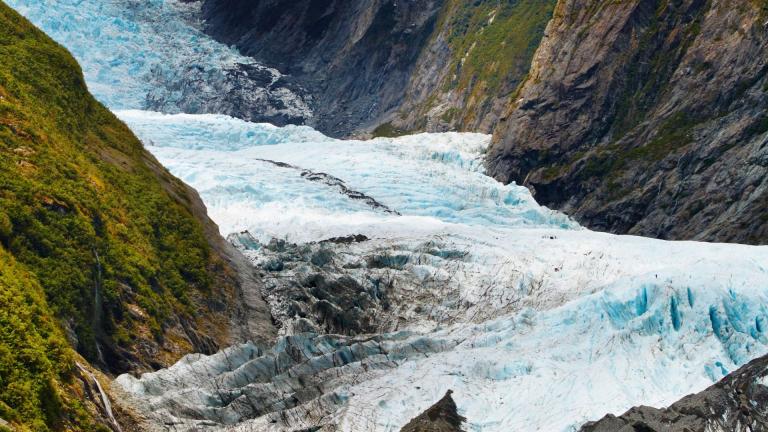
Regional cryosphere changes – global impacts
The Arctic is one of the regions most impacted by climate change. In the last 45 years, it has warmed at three times the global average, severely impacting its environment, biodiversity, and communities. But changes in the region extend far beyond the Arctic; its effects are felt worldwide.
A significant part of the population in the Arctic and high mountain regions are Indigenous Peoples. This includes over 180,000 Inuit that have lived and thrived in Inuit Nunaat, the circumpolar Inuit homeland, for millennia and have unique Knowledge about the ice and the ecosystems it sustains. Inuit livelihoods, culture, and ways of life are particularly impacted by the changing cryosphere and a multitude of other external compounding threats that were not caused by Inuit, yet they are experiencing its consequences.
“Inuit are a people of the cryosphere. We are deeply and intrinsically connected with sea ice and the nature of a frozen landscape for traveling, hunting, safely living on our lands and harvesting our marine resources. In recent years, Inuit have increasingly been impacted by the lack of ice, which affects our health, wellbeing and livelihoods, thereby impacting our collective and individual rights,” says Sara Olsvig, Chair of the Inuit Circumpolar Council (ICC).
“For centuries, the lives of communities in the Hindu Kush Himalayas have been intrinsically linked to the mountain cryosphere. Now, however the snowpack and frozen water stores that have sustained these communities’ livelihoods, settlements, cultures are disappearing at an unprecedented pace, already rendering life in too many mountain settlements unviable,” Pema Gyamtsho, Director General, ICIMOD states. “Climate-driven hazards are outpacing efforts at resilience building. We must do more to champion and amplify the ground-realities of these traditional custodians of mountain ecosystems, to revive their culture of care for cryosphere and the ecological and human systems it supports, and to equip them with the tools and finance to adapt.”
The Antarctic and Greenland Ice Sheets have certain thresholds where irreversible collapse becomes inevitable and, in the case of West Antarctica especially, may be quite close without far stronger emissions reductions, leading to potentially rapid sea-level rise that could result in 3 meters already early in the next century.
“A temperature increase of 1.5 degrees Celsius versus current policies, that will take us well above 2 degrees, makes all the difference in the world,” stated Dr. Robert DeConto, an Intergovernmental Panel on Climate Change (IPCC) author. With very high emissions, the latest IPCC Report AR6 concluded that 15 meters sea-level rise by 2300 cannot be ruled out. "Leaders must understand that we are in the cryosphere risk zone,” he concluded.
“WMO published its State of the Climate Update at COP29. It confirms that 2024 is on track to be the hottest year on record, and this has profound implications for the cryosphere. Arctic sea ice extent in 2024 was once again below average and Antarctic sea ice extent was the second lowest on record. Glacier loss is worsening. In 2023, glaciers lost a record 1.2-meter water equivalent of ice – about five times the amount of water in the Dead Sea. It was the largest loss since measurements began in 1953 and was due to extreme melting in North America and Europe. We are sending out an SOS on the cryosphere,” stated Celeste Saulo.
The side event will be recorded and made available in the "UN Climate Change - Events" channel.
- WMO Member:
- Norway ,
- Tajikistan


